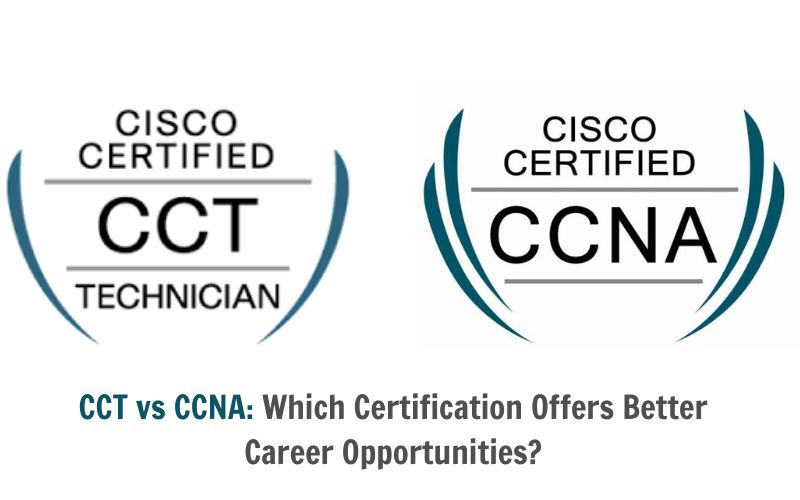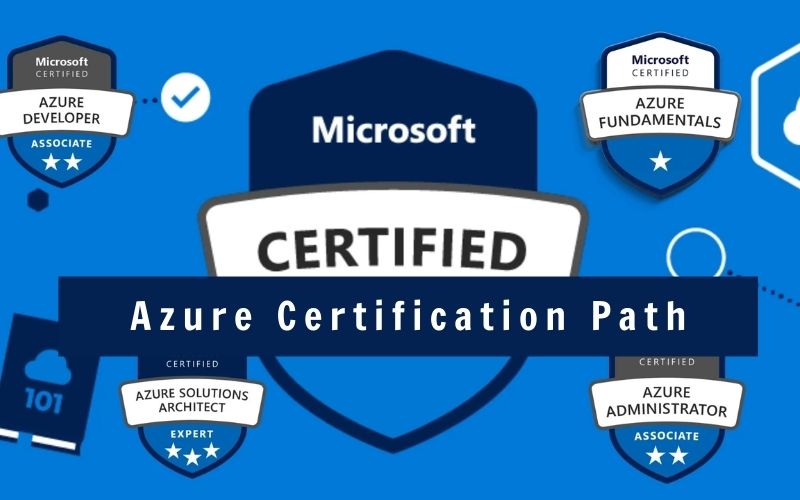As technology continues to advance, the demand for networking professionals with specialized skills and certifications is on the rise. Networking certifications not only validate your skills and expertise but also help you stand out in a crowded job market. In this article, IT Exams will explore the most popular networking certifications, what they entail, and how they can boost your career prospects.
What are Networking Certifications?

Networking certifications are credentials that validate an individual’s knowledge and skills in the field of computer networking. These certifications are typically offered by professional organizations or vendors who design and manufacture networking equipment and software.
Benefits of Networking Certifications
Investing in networking certifications will help you in a number of ways as your career develops. Your potential to land a fulfilling position in your area may directly be impacted by the time and effort you invest into acquiring new skills and preparing for IT exams. A few of the main advantages of pursuing new certifications are as follows:
Growing your technical knowledge
Obtaining a networking certification will assist you in broadening your technical knowledge and introducing you to other job possibilities if you are just starting your IT career or want to develop your career but are unsure of where to begin. You might aim to develop your abilities in that field to fulfill certification criteria after reviewing the best networking certifications. You may learn which talents you liked learning about the most by taking a variety of assessments.
You could also be able to be more creative in your present role as your knowledge base expands. Learning new methods for carrying out crucial networking activities like cybersecurity management and cloud integration is frequently a requirement for certification. Your existing position might become more productive and successful with the aid of these new skills, and you could even be able to take on additional responsibility.
Simplifying the application process
It’s typical for IT firms to demand specific qualifications prior to an application. Being certified early on might make it simpler to qualify for and apply for new jobs because networking abilities are essential for practically any sort of IT career. Without having to prepare for a new exam and wait for your certification results again, a powerful combination of networking certifications can help you position yourself as a competitive applicant for positions in your sector.
Competing against other applicants
Having a significant number of pertinent certificates is required to compete with other applicants for IT careers since networking certifications have become a norm in the IT business. It’s critical for you to be able to demonstrate that you have the same degree of expertise as well as more when the majority of applicants for a position are certified. Because they view certified experts as a more trustworthy option, some companies would not even consider applicants who do not have the necessary qualifications in networking-related areas.
Expanding career opportunities
Networking ideas are used in numerous IT domains, leading to a variety of certification alternatives that concentrate on various themes. A certification might be an excellent method to start earning expertise in a new field if you’ve been considering switching your career to a different area of the IT business. Employers may see this as evidence that you have the foundational knowledge necessary to further your career in a new direction and are able to apply your present IT abilities to a new speciality.
Additionally, networking certifications might help you develop in your present employment by improving your chances of getting promoted and broadening the scope of your work. Numerous networking certificates place equal emphasis on technical expertise and project management skills, which can match your experience with top leadership positions.
Increasing your earning potential
Top firms may offer competitive applicants with advanced credentials a higher wage and benefits. Depending on the verified abilities you would offer to the organization in comparison to an uncertified applicant, you could be able to utilize top certifications as a tactic for negotiating a greater pay rate. Some employers may even cover the cost of your certification so they may hire highly trained employees who can draw clients and consumers to their businesses with their knowledge
Popular Networking Certifications
There are many networking certifications available, but some are more popular and recognized than others. Here are a few:
Cisco Certifications

A certification at the associate level that focuses on the concepts and difficulties of IT networking is called Certified Cisco Network Associate (CCNA). It involves network access, Internet connectivity, and IP-based services. Despite the fact that it is not vendor neutral—you will only be tested on Cisco tools and products—it is fairly well-known among network administrators because of Cisco’s dominant position in the networks industry. Candidates just need to pass one test to earn the CCNA certification.
Jobs to consider include network administrator, system administrator, and NOC engineer.
You need to pass one certification test. Although there are no requirements for the test, Cisco advises having a year of training and networking experience.
The Cisco Certified Network Associate (CCNA) is the initial step for anyone interested in obtaining more specialized network certifications, including the Juniper Networks Certified Associate (JNCIA-Junos) or the Cisco Certified Network Professional (CCNP).
CompTIA Certifications

A broad and diversified education in information technology (IT) at the entry level often includes earning the CompTIA A+ certification. Successful candidates for the certification exams will be able to address basic issues with networking, cybersecurity, Linux operating systems, and portable devices. To receive the CompTIA A+ certification, two exams must be passed.
An extensive introduction to information technology (IT) is provided via the CompTIA A+ certification.
Many IT employees may then move on to become authorities in a specific field of information technology, such as networks, security, or cloud computing, either by gaining more pertinent work experience or by obtaining certifications in the necessary fields.
Some jobs you can earn with this certification are desk analyst, NOC specialist, network engineer, desktop administrator, technical support
There are two certification exams that are required. Although there are no prerequisites for CompTIA exams, the organization does advise candidates to have nine to twelve months of work experience prior to taking the tests.
Following completion of the CompTIA A+ exam, candidates have the choice of pursuing other certifications from the same organization, such as Security+ or Network+, or certifications from different sources, such as the CCNA.
Read more >> Average IT Salary in 2023: A Comprehensive Guide
Certified Wireless Network Professional (CWNP)
Another well-known certification in the networking sector that focuses on wireless networking technology is the Certified Wireless Network Professional (CWNP) program. The entry-level Certified Wireless Technology Specialist (CWTS), the intermediate Certified Wireless Network Administrator (CWNA), the advanced Certified Wireless Security Professional (CWSP), and the expert Certified Wireless Network Expert (CWNE) are all certification levels offered by the CWNP program.
Wireless LAN design and analysis, wireless security, and spectrum analysis are just a few of the subjects that the CWNP curriculum covers. Wi-Fi, Bluetooth, and Zigbee are just a few of the specific technologies and vendor products covered in the curriculum.
The CWNP program is unusual in that it is vendor-neutral, which means it is not dependent on any one vendor’s goods or technology. As a result, people may get a comprehensive grasp of wireless networking technology and apply that knowledge to a range of vendor products.
The CWNP program also provides a selection of learning tools and resources, including study manuals, sample tests, and training sessions with instructors. This might be useful for people who want to learn more about wireless networking topics and get ready for certification tests.
Amazon Web Services AWS Cloud Practitioner
One of the most in-demand specialities in the field of information technology (IT) is the usage of cloud computing, and AWS, or Amazon Web Services, is now the cloud platform that is utilized the most globally. Therefore, having experience with the AWS platform might provide you a competitive edge in this sector. The entry-level qualification in the AWS credential structure is the Cloud Practitioner certification.
The AWS Cloud Practitioner certification may be quite helpful for those who are new to the industry of IT since it will help them learn the basics of AWS. On the other hand, a lot of employment in the cloud need an associate level certification from Amazon Web Services, which is a level higher than the practitioner certification. The associate-level AWS Solutions Architect, SysOps Administrator, or Developer certifications may be a better fit for you if you have previously worked with Amazon Web Services (AWS) for a year. These credentials will better prepare you for entry-level jobs in the cloud computing industry. You might also want to check at other cloud credentials like the Google Associate Cloud Engineer certification or the Microsoft Azure Fundamentals qualification.
Jobs to consider include system administrator, DevOps specialist, and cloud technical support.
There are no prerequisites for taking the exam, although Amazon advises having at least a rudimentary understanding of how to use and use AWS services, as well as around six months of experience doing so.
You can seek other certifications, such as those needed to become an AWS Certified Developer or an AWS Certified Solutions Architect, after earning the Amazon Web Services (AWS) Cloud Practitioner credential.
Cisco Certified Network Associate CCNA
Certification at the associate level that focuses on the concepts and difficulties of IT networking is called Certified Cisco Network Associate (CCNA). It involves network access, Internet connectivity, and IP-based services. Despite the fact that it is not vendor-neutral—you will only be tested on Cisco tools and products—it is fairly well-known among network administrators because of Cisco’s dominant position in the networks industry. Candidates just need to pass one test to earn the CCNA certification.
Jobs to consider include network administrator, system administrator, and NOC engineer.
It takes one certification test. Although there are no requirements for the test, Cisco advises having a year of training and networking experience.
For those interested in obtaining more specialized network certifications, such as the Juniper Networks Certified Associate (JNCIA-Junos) or the Cisco Certified Network Professional (CCNP), the Cisco Certified Network Associate (CCNA) is the initial step.
How to Choose the Right Networking Certifications

Given the extensive variety of available IT certifications, it might be challenging to decide which ones to pursue. When selecting IT certifications, keep the following factors in mind.
1. The IT Field You Want to Specialize In
Before picking which certification to pursue, consider your professional objectives and the precise abilities you need to attain them. It’s critical to comprehend the benefits of each certification for you as an IT expert.
There are several certifications available in a variety of IT fields, including hardware, software, and security. The sort of IT professional you wish to be should thus be decided upon before pursuing an IT certification.
For instance, CompTIA Security+ or other cybersecurity courses are definitely a good place to start if you want to become a security professional. This is as a result of Security+’s emphasis on security-related subjects.
2. The Time Frame for Obtaining an IT Certification
How long does it take to earn an IT certification can be one of your concerns. In a nutshell, certain tasks can be finished in a week or two while others can take months. Make sure you have enough time so that obtaining your certification won’t conflict with other obligations.
3. The acceptance of IT certifications
Knowing which certifications are highly prized by companies and which ones might advance you in your profession is a smart idea, even if you’re just getting started in IT. You may learn what qualifications businesses are looking for for entry-level roles by researching the most popular IT certifications.
4. Certification Body Accreditation
You should ensure that the supplier of your IT certification is reliable. There are many different kinds of IT certifications available, some of which are provided by unauthorized accreditation bodies.
FAQs
How long does it take to obtain a networking certification?
Depending on the networking certification and your level of expertise in the area, the time it takes to earn it might vary. More fundamental certificates, like the Cisco Certified Internetwork Expert (CCIE), might need years of study and hands-on experience to earn, whilst entry-level certifications, like the CompTIA Network+, can be earned with a few months of preparation and study.
How do I know which networking certification is right for me?
Your professional objectives and your interest in particular technology will determine this. You may choose the certification that is best for you by researching various certificates and their criteria.
How much do networking certifications cost?
Depending on the certificate and the supplier, networking certification fees change. The cost of a certification test normally ranges from $150 to $500, and additional expenses may apply for training materials like study guides or online courses. While more expensive certificates like the CCIE might cost several thousand dollars, entry-level credentials like the CompTIA Network+ can cost only a few hundred.
How do I prepare for a networking certification exam?
To assist you in getting ready for the test, the majority of certification providers give study guides and training programs. You may also get study materials online or from independent vendors.
Are there any prerequisites for networking certifications?
Prerequisite qualifications or relevant work experience may be needed for some certifications. A networking certification can be obtained without a college degree. However, certain certificates could have requirements, such previous professional experience or familiarity with a certain technology. Before seeking a particular certification, make sure to investigate the prerequisites.
Can I maintain my certification after I obtain it?
For the most part, credentials must be renewed or need continuous education. By doing this, qualified experts are guaranteed to be current with market trends and innovations.
Depending on the qualification, different renewal conditions may apply to networking certificates. While some certificates need to be renewed annually, others may have a multiple-year renewal term. It’s crucial to confirm the particular certification you now hold’s renewal criteria.
Conclusion
In conclusion, gaining a networking certification will significantly increase your employment prospects and income potential in the ever expanding information technology industry. With so many certificates available, it’s crucial to do your homework and pick the one that best suits your interests and professional aspirations. The certification process might be difficult, but with perseverance and the right planning, success is attainable.
It’s vital to remember that earning Networking certifications does not ensure career success. Additionally, employers seek candidates with real-world experience and the capacity to apply their academic learning. Therefore, it is advised to acquire practical experience through internships or entry-level jobs in the industry.
In conclusion, earning a networking certification might be an excellent professional investment. You may grow in the field of information technology and open doors to new employment options with the correct certification and the right training.
[Sassy_Social_Share]




